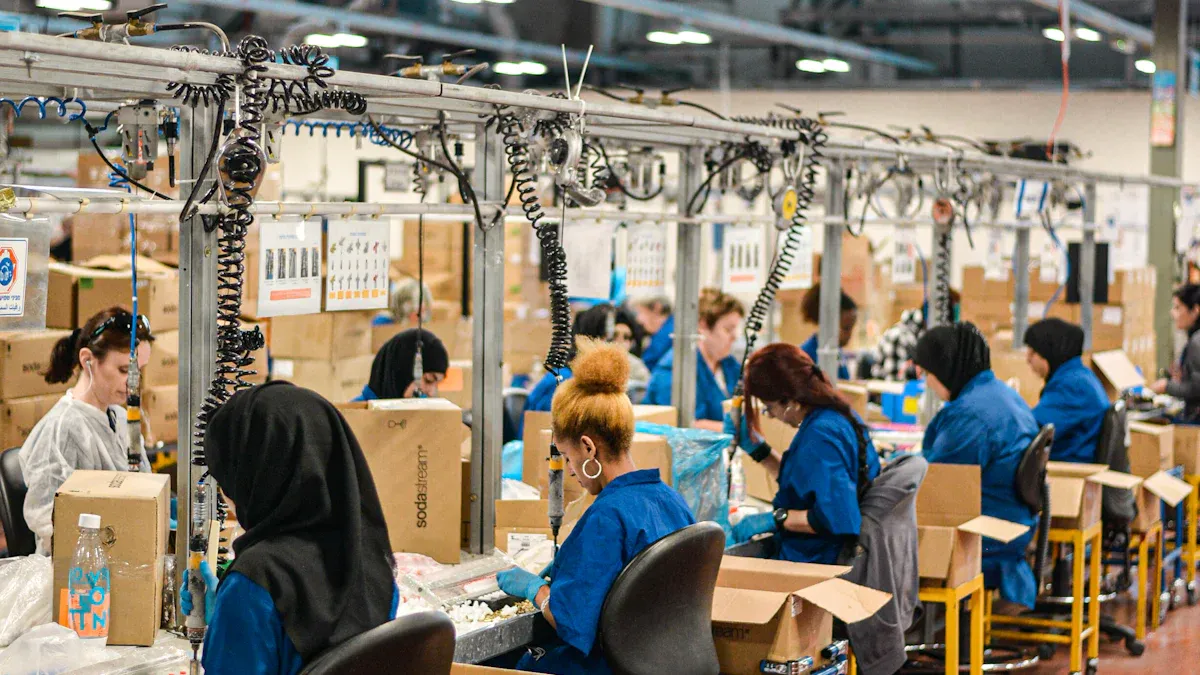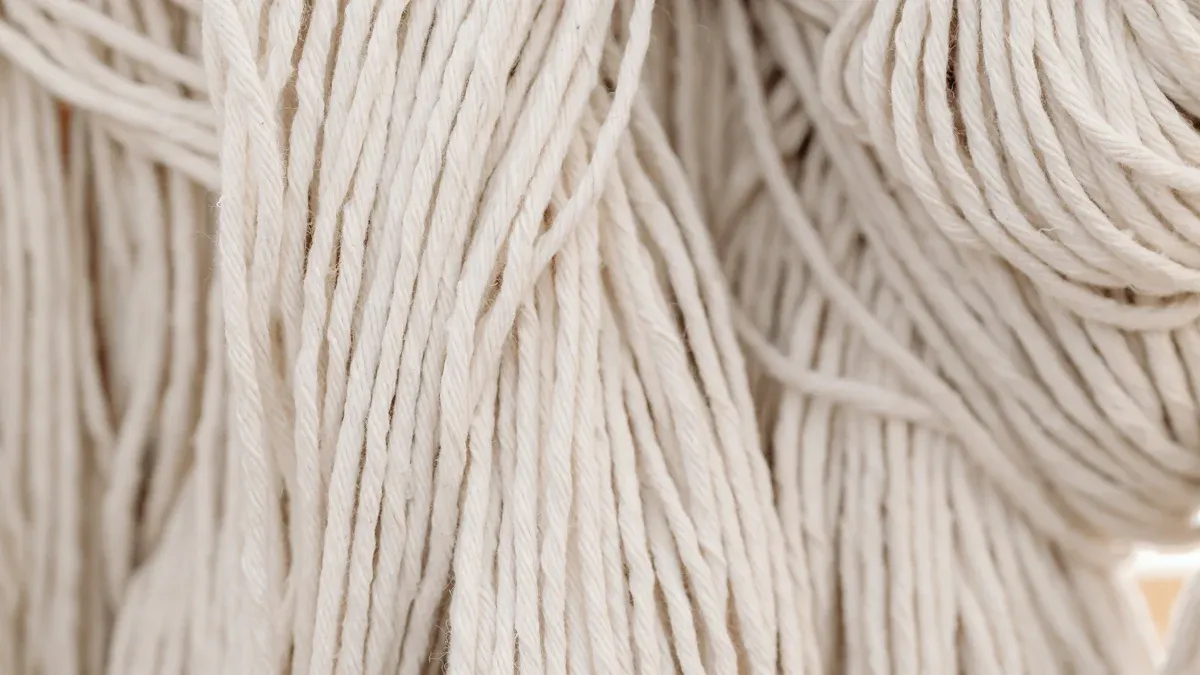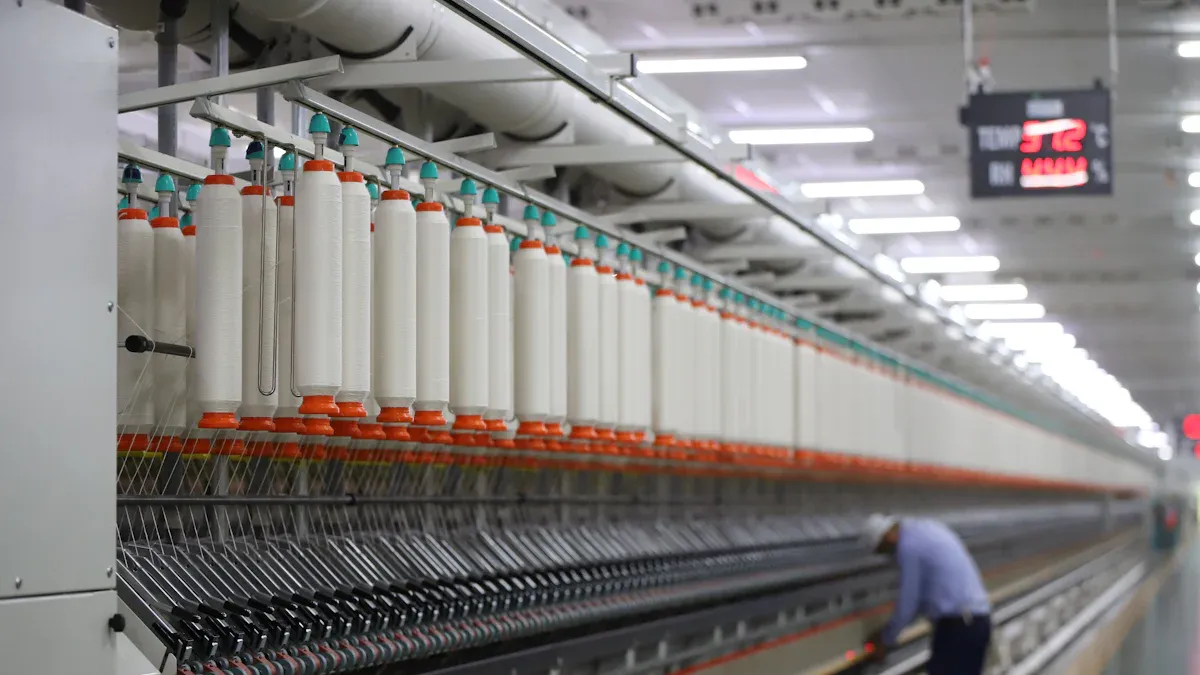
Beltinka Beltinci d.o.o., Fush, Soven, Polzela, Maximo Tekstil, and Kobram Ltd. are recognized as top knitwear manufacturers in Slovenia’s industry. Each company boasts a long history and produces a wide range of products. They prioritize environmental responsibility and maintain a strong focus on quality, making them trusted partners. Slovenian top knitwear manufacturers excel in technology, sales, and IT innovation compared to most others.
Innovation Aspect | Slovenian Companies’ Relative Performance | Specific Values |
|---|---|---|
Technologies | Higher than overall sample by +0.33 | +0.33 |
Sales | Higher than overall sample by +0.78 | +0.78 |
IT Innovation | Higher than research innovation | IT: 3.40, Research: 2.90 |
Companies seeking the top knitwear manufacturer benefit greatly from this modern approach.
Key Takeaways
Slovenian knitwear makers make great products. They use eco-friendly materials and local factories. This helps cut down waste and helps workers.
The best companies use smart machines and automation. These tools help them work faster and make better products. They also help the planet.
Factories care about the environment. They watch their carbon footprints and use recycled fibers. They also follow green rules and get certificates.
Makers work closely with clients to make special designs. They can change things fast to fit what people want.
Buyers should look at how much a factory can make. They should check quality, green certificates, and how well they talk with clients. This helps them pick the best knitwear partner.
Why Slovenia for Knitwear

Quality Reputation
Slovenian knitwear makers are known for great quality. Some brands, like Mila.Vert, use only 100% organic cotton. They get their fabric from trusted agents who care about the planet. Local partners, such as Liniatex and Krona, help keep things honest and high-quality. These companies make small batches that are pre-ordered to cut down on waste. They care about being green and fair to workers. Their supply chains are local, which helps their good name. Even if they do not always have outside certificates, their actions show they care about doing the right thing.
Mila.Vert uses only organic cotton in its luxury knitwear.
Trusted local partners ensure eco-friendly and ethical materials.
Production remains local, supporting transparency and quality.
Small batch manufacturing reduces waste.
Ethical labor and local supply chains enhance brand reputation.
Skilled Workforce
Slovenia’s knitwear industry has many skilled workers. Many people have worked in textiles for a long time. New workers learn through training and apprenticeships. Companies keep teaching their teams new skills. This helps them make knitwear with great detail and care. Their skill lets them make hard designs and custom orders well.
Innovation and Sustainability
Innovation and caring for the planet are important in Slovenia’s knitwear. Companies use smart machines, cloud tech, and robots to work better. They pick materials like recycled plastics and eco-friendly fibers. Trade shows, like Techtextil and ITMA, show off new green ideas. The industry follows rules like Reduce, Reuse, and Recycle to help the earth.
Aspect | Details |
|---|---|
Market size (2021) | |
Expected size (2029) | $1606.67 billion |
Growth drivers | Demand for sustainable fibers, innovation |
Magazines for the knitting industry share tips and data about being green. This focus on new ideas and caring for the planet makes Slovenia a top place for knitwear.
Top Knitwear Manufacturer Profiles

Beltinka Beltinci d.o.o.
Beltinka Beltinci d.o.o. is a top knitwear maker in Slovenia. The company started many years ago and is known for being reliable. Beltinka makes fancy knitwear for men, women, and kids. They use new knitting machines and care about the environment. The team recycles waste and uses special methods to help nature. Every item gets checked before it is shipped. Beltinka works with brands from other countries. These brands want a partner who values tradition and new ideas.
Fush
Fush is a famous name in Slovenian knitwear. It began as a small family company and grew bigger. Fush makes many things like sweaters, scarves, and hats. They use both old and new ways to make knitwear. Fush buys new machines and teaches workers new skills. Designers pick eco-friendly fibers and make small batches. Fush is special because it mixes classic looks with new styles. People from all over Europe like Fush for its quality and green choices.
Soven
Soven has a different way of making knitwear. The company started by using natural fibers and making things locally. Soven is known for wool clothes and accessories. They get materials from trusted local suppliers. Soven uses old cut and sew methods that are still popular. The company also tries new things like recycled fibers. This helps meet the need for green products. Soven’s team checks every detail for quality. Many people pick Soven for its mix of tradition and caring for the earth.
Polzela
Polzela has been around for a long time in Slovenia. The company started over 90 years ago and is famous for socks. Now, Polzela makes tights, leggings, and sportswear too. They use new knitting machines and follow strict rules for quality. The team recycles waste and tries to help the planet. Polzela’s products are good for both fashion and sports. The company stays a top knitwear maker by using experience and new ideas.
Maximo Tekstil
Maximo Tekstil is known for making knitwear for babies and kids. The company started small but now sells across Europe. Maximo Tekstil uses soft and safe materials. They follow strong safety rules. Designers make bright and comfy clothes. The company buys new machines and trains workers on new skills. Every item is checked before leaving the factory. Maximo Tekstil is a top choice for children’s knitwear because of its focus on safety and comfort.
Kobram Ltd.
Kobram Ltd. uses new ways to make knitwear. The company first made technical knitwear and then added more products. Kobram Ltd. uses advanced machines and digital tools. The team makes custom orders and small batches. They care about the planet by using recycled fibers and cutting waste. Every item is checked to make sure it is good. Kobram Ltd. is known for smart ideas and good service.
Surveys show many knitwear makers, even in Slovenia, want to use better materials and fibers to help the planet. Most still use old cut and sew ways, but some top companies use new machines and check quality. These steps help cut waste and make better products.
What Makes the Best Stand Out
Advanced Technology
Top knitwear makers in Slovenia use new technology to stay ahead. They have computer flat knitting machines with digital controls and sensors. These machines use IoT to help teams watch production as it happens. This means less waiting and fewer stops. Automation helps make every item the same and keeps quality high. These machines can make hard patterns and special designs. They use just the right amount of yarn, so there is less waste. This helps the planet. Some factories pick single or multi-system machines for their needs.
Computerized machines let teams watch work in real time and stop delays.
Automation keeps quality the same and needs fewer workers.
New machines help make cool designs and change fast.
Smart textiles can control temperature or check health.
Machines like Autarkic Direct Feeding (ADF) let designers do more.
Benefit Category | Description | Measurable Outcomes / Case Study Highlights |
|---|---|---|
Fast change from idea to finished product | Quicker to market, shorter wait times | |
Production Efficiency | Less waiting means work keeps going | More gets done, deadlines are met |
Flexibility & Customization | Can make small batches and print on demand | Special designs, less extra stock |
Environmental Impact | Uses fewer chemicals and makes less pollution | Greener work, better for the earth |
Integration & Training | Fits with old systems and teaches workers new skills | Easy to use, better with digital tools |
Business Improvements | Real companies use these ideas | Work is faster and products are better |
Sustainable Practices
The best Slovenian factories care about the planet. They use blockchain to track carbon footprints and resources at every step. This saves money and helps customers trust them by showing real data. AI and automation help make only what is needed, so there is less waste. Many factories try to get LEED certificates, which means they save water and manage waste well. These actions help the earth and make factories work better.
Aspect | Impact on Operational Efficiency and Sustainability |
|---|---|
Working together cuts redo work, saves money, and lowers extra stock; automation stops losses. | |
Waste Reduction | Less trash means lower costs and follows green rules. |
Brand Reputation | Green actions make people want to buy and trust the brand. |
Competitive Advantage | Using new green tech early helps lead the market. |
Operational Optimization | Watching data live and linking jobs helps make good choices and cut waste. |
Green actions help the earth and also make work better and brands stronger.
Customization
Customization helps top knitwear makers stand out. They work closely with customers and suppliers. This teamwork helps them make new designs and answer requests fast. ICT tools help collect and study what customers want. Teams use their skills to fix problems and keep custom orders going well. These things help companies stay ready for changes in the market.
Working with clients brings new and creative products.
ICT tools help answer fast and study customer needs.
Skilled teams make sure custom work goes smoothly.
Customization lets companies make special products for each customer, helping them lead the market.
Choosing Your Knitwear Partner
Production Capacity
Buyers need to know if a factory can make enough products. They should look at how many machines the factory has. It is also important to check how many hours the machines run each day. Buyers should ask how long it takes to make each item. For example, knowing how many pieces are made daily shows if orders can be finished on time. Factories that have worked for many years are usually more reliable. Certifications like ISO also show a company can be trusted.
Tip: Ask factories for yearly production numbers and machine info. This helps you compare different companies.
Key Capacity Metrics:
Number of machines
Shift hours per day
Standard Allowed Minutes (SAM) per product 4. Average line efficiency
These numbers help buyers see if the factory can handle their order size.
Quality Assurance
Good knitwear comes from strong quality checks. The best factories test materials before making anything. They check products at every step. They use rules like ASTM and ISO to test things like stretch and color. They also check if the fabric can handle rubbing. At the end, they make sure the fit and strength are right. Certifications like OEKO-TEX® and outside tests give extra trust.
Material testing before production
In-line and final inspections
Use of Martindale Abrasion Tester
Adherence to global standards
Buyers should ask for test results and certificates to make sure quality stays high.
Sustainability
Being green is very important now. Top factories have certificates that show they care about the earth and people. These include GOTS for organic textiles and GRS for recycled content. OEKO-TEX® checks for chemical safety. The Higg Index measures how factories help the planet and treat workers.
Certification | Focus Area |
|---|---|
GOTS | Organic, ethical production |
GRS | Recycled content |
OEKO-TEX® | Chemical safety |
Higg Index | Environmental performance |
Picking partners with these certificates helps you buy in a responsible way.
Communication
Clear and quick talking keeps work going well. The best factories use digital tools to watch how workers and machines are doing. Teams get feedback right away to fix problems fast. Data from sensors and computers helps plan better and answer quickly.
Immediate feedback on quality
Digital workload balancing
Note: Good communication means less waiting and better results for your business.
When picking a knitwear partner, buyers should match what they need with what the factory does best. This helps make sure the partnership is strong, high-quality, and good for the planet.
Slovenia’s top knitwear makers are known for great work and care for the planet. They can change their work to fit what each customer needs. They help new brands and small shops by making special orders and not needing big orders. The table below shows what they do well:
Strength | Value |
|---|---|
Monthly Output | |
Daily Fabric Production | Up to 2.5 tonnes |
Sample Lead Time | 3–4 weeks |
Competitive Advantages | Flexibility, sustainability, technology |
Picking a top knitwear maker means you get good results. You should look at the guide above and talk to the companies for prices or more info.
FAQ
What is the typical minimum order quantity for Slovenian knitwear manufacturers?
Most Slovenian knitwear makers let you order small amounts. Many companies help new brands and startups. Some factories will start with just 100 pieces for each style.
How long does it take to produce a custom knitwear order?
It usually takes 3 to 8 weeks to make custom knitwear. The time depends on how hard the design is and how big the order is. Making samples can take 2 to 4 more weeks.
Which certifications do top Slovenian knitwear factories hold?
Certification | Focus Area |
|---|---|
OEKO-TEX® | Chemical safety |
GOTS | Organic textiles |
GRS | Recycled content |
Many top factories have at least one of these certificates.
Can Slovenian manufacturers handle custom designs and private labels?
Slovenian manufacturers are good at making custom products. They help with private labels, special patterns, and unique packaging. Teams work with clients to make sure designs are just right.









